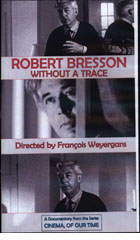
Robert Bresson: Without a Trace 1994
Distributed by First Run/Icarus Films, 32 Court St., 21st Floor, Brooklyn, NY 11201; 800-876-1710
Producer n/a
Directed by Francois Weyergans
VHS, b&, 64 min.
College - Adult
Film Studies, Media Studies
Date Entered: 11/09/2018
Reviewed by Charles H. Burkart, Head, Media Services, West Virginia University, Morgantown, WVRobert Bresson is the most unrated of the major French Film Directors. His use of non actors (or little known actors) as well as his unemotional, minimalist directing style have limited his popularity to film historians, movie buffs and contemporary Francophiles. Nevertheless, his better known films: Diary of a Country Priest (1950), Pickpocket (1959), Proces de Jeanne d’Arc (1962), Au Harsard Bathazar (1966), and Lancelot du Lac (1974) are still studied and admired.
Robert Bresson: Without a Trace is mostly a conversation with Bresson filmed by author Francois Weyergans in 1965. It is, as far as I know, the only filmed interview (Bresson “directed” the questions) granted by this elusive director. It consists of Bresson answering questions and commenting on such varied subjects as Chardin, Matisse, Cezanne, cinema vs theater, Cocteau, Pascal, Dostoevsky, Montaigne, Lipatti, actors vs protagonists, cinema music, Goldfinger, etc. Bresson’s comments are pithy, rapid fire, and always entertaining and interesting. He can be hard to follow at times, but he is always worth hearing.
The film’s action is for the most part static, and only Bresson’s shotgun-like commentary really keeps the film going. The black and white cinematography is only adequate. The film quality is frequently grainy and dark. Too many rapid cuts are used in the first part of the interview. Excerpts from two movies (Proces de Jeanne d’Arc and Pickpocket) are shown as brief examples. The only musical accompaniment is provided by the film excerpts. The English subtitles are easy to read
I found Francois Weyergans’ postscript to his original 1965 documentary to be unnecessary. It consisted mostly of his wife reading excerpts from Literature that inspired some of Bresson’s films. Some posters of late Bresson films were also presented. The presentations were episodic and didn’t hold together well.
This is an important documentary for the study of French films. It would be a valuable addition in comprehensive college film collections. I recommend Robert Bresson: Without a Trace.